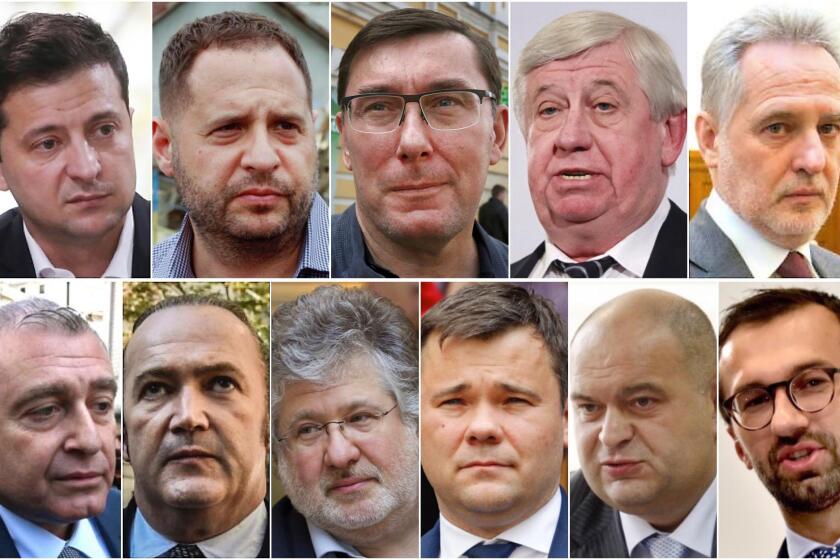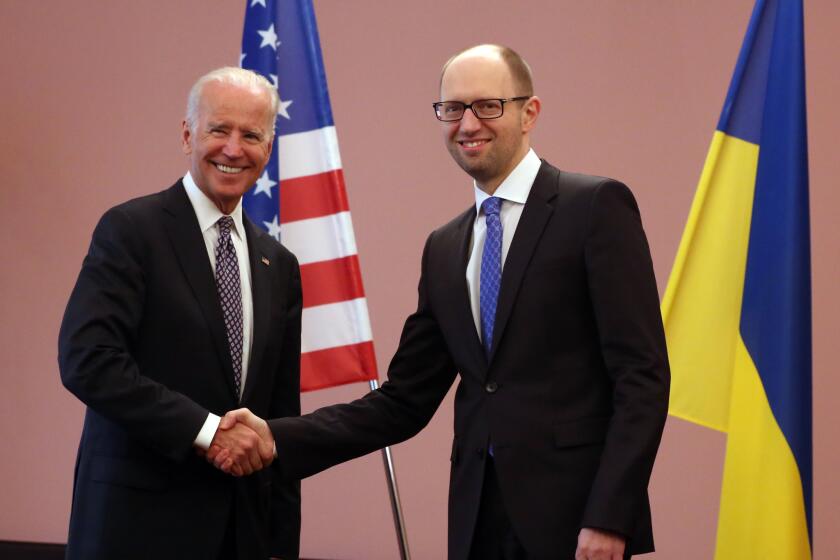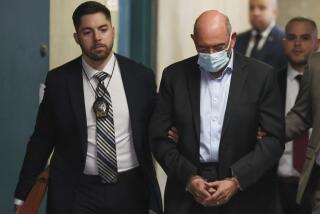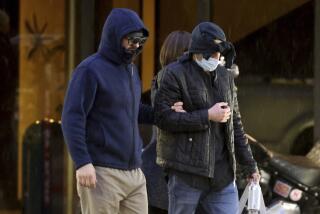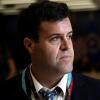Indicted Ukrainian oligarch embraces Trump’s theories as he fights extradition
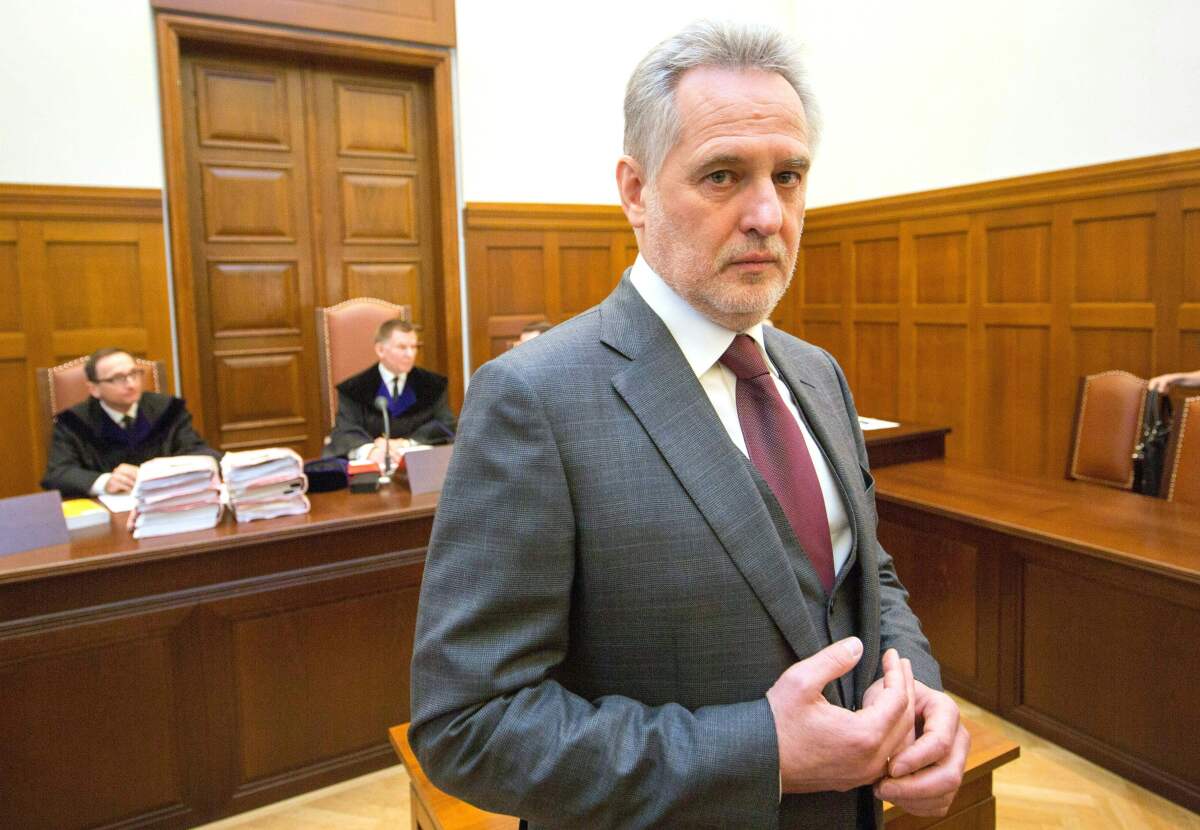
As he fights extradition to the U.S., a Ukranian tycoon and alleged “upper-echelon” associate of the Russian mafia has aligned his defense closely with President Trump: He has hired lawyers who travel in the president’s inner circle and is pushing theories that he is being targeted for political reasons.
Dmytri Firtash — who is under house arrest in Austria after posting a $174-million all-cash bond — has spent nearly six years trying to avoid prosecution in the U.S. on bribery charges tied to mining rights in India. In that effort, he has assembled a cast of characters familiar to anyone tracking the presidential impeachment drama and special counsel Robert S. Mueller III’s probe into Russia’s interference in the 2016 election.
In previous administrations, the oligarch’s strategy of linking himself to a U.S. president’s travails would have been considered risky because it could have provoked the Justice Department to assertively prove its independence. Under Trump, however, Firtash’s strategy may be a smart move, some former federal prosecutors said.
A 2013 indictment in federal court here charges Firtash with bribing officials in India to secure licenses to mine minerals, including titanium for use by a major airplane manufacturer, identifiable in court records as Boeing, the aerospace giant.
Zelensky, Lutsenko, Leshchenko, Zlochevsky ... the numerous names in Ukraine mentioned in the impeachment inquiry are hard to keep straight. We break each of them down to make it easier to understand who’s who in Kyiv and beyond.
But to hear the legal arguments Firtash makes and the lawyers he has hired to make them, you might suspect the case had far more to do with the impeachment proceedings against Trump than Indian bribes.
In July, Firtash jettisoned his legal team — led by a Democrat who also represented Michael Cohen, Trump’s now-estranged former personal lawyer. He then hired attorneys Victoria Toensing and Joseph diGenova, a conservative power couple who frequently defend the president on television and radio and criticize investigations of him. The two have also worked closely with Trump’s current personal lawyer, Rudolph W. Giuliani.
In recent months, Toensing and diGenova scored a rare face-to-face meeting with Atty. Gen. William Barr in which they asked him to drop Firtash’s extradition, a Justice Department official said, confirming a Washington Post account of the lobbying effort. Barr declined to get involved, the official said.
Toensing, who declined to comment about the meeting, said the federal prosecution of her client was politically motivated and he had done nothing wrong.
“The case against Mr. Firtash is a legal travesty,” Toensing told The Times. “He is an innocent man. Sadly, the Department of Justice has submitted false and misleading statements about him and the evidence to the Austrian courts.”
Firtash initially claimed he was indicted because Washington wanted to prevent him from influencing Ukrainian politics during the country’s fragile transition after a 2014 revolution deposed President Viktor Yanukovych, whose government Firtash had supported.
Firtash won an early round in an Austrian court, but in February 2017, an appeals court upheld the U.S. request to extradite him.
In June, Firtash’s legal team gave Austrian officials an affidavit from Viktor Shokin, the former Ukrainian prosecutor general who was fired in 2015 under pressure from Western governments, including the Obama administration, which accused him of stalling on high-profile corruption cases.
In the affidavit, Shokin said former Vice President Joe Biden had warned the Ukrainian government to keep Firtash out of Ukraine in order to stop him from further influencing the country’s politics. Shokin’s affidavit also claimed that he was fired because he was investigating Burisma, a Ukrainian natural gas company for which Biden’s son Hunter was a board member.
Joe Biden made at least half a dozen visits to Ukraine when he was vice president. Here’s what he was doing.
Giuliani has cited Shokin’s affidavit in support of his claims that Biden should be investigated. Other Ukrainian officials — as well as U.S. officials — have said Biden’s pressure to fire Shokin had nothing to do with Burisma. The investigation of the company was dormant by the time Biden pushed for Shokin’s dismissal, they say.
Firtash’s lawyers in Austria have also filed sealed court papers that criticize the Justice Department in line with theories promoted by Trump suggesting that investigators were improperly motivated by politics, according to people familiar with the arguments. The Justice Department has rebuffed those assertions, and officials have noted Firtash was indicted before Trump announced his candidacy and four years before Mueller was appointed special counsel.
Firtash hired Toensing and diGenova on the recommendation of the couple’s Russian translator, Lev Parnas, according to people familiar with the legal team’s work.
Toensing, diGenova and Parnas were actively helping Giuliani gather information on Democrats who they claim have ties to Ukraine, according to people familiar with their work.
Parnas and a business partner, Igor Fruman, are longtime clients and associates of Giuliani. They’re both now under indictment after they were arrested in early October while trying to leave the country. They’re charged with funneling illegal campaign donations to a Trump-allied political fund and Republican politicians.
When they were arrested at Washington’s Dulles International Airport, the pair had one-way tickets to Austria.
Federal investigators, as well as House Democrats, are now exploring potential ties among Parnas, Fruman and Firtash, according to people familiar with the matter, who spoke on condition of anonymity because they were not authorized to discuss the subject on the record. Giuliani, who did not respond to text messages seeking comment, has denied knowing the oligarch.
Federal prosecutors are examining Giuliani’s financial dealings in Ukraine, and with Parnas and Fruman, a person familiar with the matter said, confirming reports in the Wall Street Journal and New York Times.
Firtash is one of a handful of Ukrainian businessmen whose power and money have influenced politics and policies in the countries of the former Soviet Union. Starting in the early 1990s, he made his fortune brokering deals buying natural gas from Russia and Central Asia to sell to Ukraine and Europe.
Firtash’s holding company, Group DF, has significant assets and interests in Ukraine. The company’s website says that in addition to gas distribution in Europe and Asia, Group DF has operations in the fertilizer, chemicals and titanium businesses as well as agribusiness, media and real estate. Many of his assets are in regions of eastern Ukraine now controlled by Russian-backed separatist militias as well as Russian-annexed Crimea.
Throughout Ukraine’s two decades of independence since the breakup of the Soviet Union, Firtash has used his wealth and power to influence the country’s politics. He and another Ukrainian oligarch, Rinat Akhmetov, financially backed Yanukovych and his Russia-aligned political party, the Party of Regions, during several political campaigns.
Trump’s former campaign chairman, Paul Manafort, worked as a consultant for the Party of Regions and Yanukovych beginning in 2005. Manafort is currently serving 7½ years in a U.S. prison for financial fraud largely stemming from that work.
The bribery case against Firtash appears to be strong, former prosecutors noted, and the surest way to avoid prison time would be to convince Trump and the Justice Department to drop extradition.
“In the past, this was a strategy that was entirely counterproductive — prosecutors were extremely sensitive to the charge that anything they were doing was politically motivated,” said Peter Zeidenberg, a former federal prosecutor.
Now, however, “it’s sad to say, but this strategy might be the appropriate one to take, given the politicization of today’s Justice Department,” he said. “Close associates of the president seem very likely to get extraordinary access and favorable treatment.”
Times staff writer Wilber reported from Chicago and special correspondent Ayres from Kyiv, Ukraine.
More to Read
Get the L.A. Times Politics newsletter
Deeply reported insights into legislation, politics and policy from Sacramento, Washington and beyond. In your inbox three times per week.
You may occasionally receive promotional content from the Los Angeles Times.
